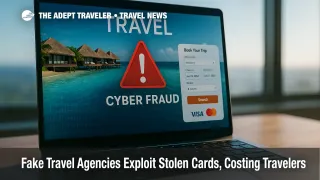Fake Travel Agencies Exploit Stolen Cards, Costing Travelers Billions

A new breed of cybercriminal-dubbed "dark-web travel agents"-is offering luxury vacations at unbelievable prices. Behind the slick websites and social-media ads lies a triangulation fraud that uses stolen credit-card data and hijacked loyalty accounts to fund real bookings, while victims unwittingly bankroll the crime. Industry researchers warn that these fake travel agencies helped push travel-related fraud losses to roughly $37 billion in the past year. Here is what travelers and advisors need to know.
Key Points
- Why it matters: Fraudulent "agencies" erode trust and expose travelers to chargebacks.
- Scam uses stolen cards and frequent-flyer miles for legitimate tickets.
- Bookings are made 24-48 hours out, dodging airline fraud filters.
- Some buyers knowingly collude to get steep discounts.
- U.S. regulators urge careful vetting of online travel offers.
Snapshot
The fake travel-agency model is simple yet lucrative. Operators set up professional-looking sites or Telegram channels that advertise premium trips-business-class flights, five-star resorts, even destination weddings-at up to 50 percent off. When a traveler pays the advertised "deal," the fraudster immediately books the itinerary on a legitimate supplier site, but pays with a compromised credit card or siphoned loyalty balance. Because the reservation is real and issued in the customer's name, alarms rarely sound until months later, when chargebacks or fraud reports surface. Criminals keep the margin, victims face canceled plans or liability, and suppliers eat chargeback fees.
Background
Trustwave SpiderLabs reports that organized groups such as Pastriarch and Serggik00 now run full-service "agencies" on darknet forums, complete with 24-hour customer support and refund guarantees. These actors buy card dumps and loyalty credentials from breach markets, then automate booking through bots that mimic normal user behavior. Risk-management teams struggle because transactions appear legitimate and often originate from the same country as the traveler. The Federal Trade Commission notes a parallel surge in spoof travel websites, phishing emails, and social-media ads pushing "exclusive" packages-tactics that funnel fresh victims into the fraud pipeline.
Latest Developments
Organized "Agencies" Go Global
SpiderLabs' May 2025 hospitality deep dive shows dark-web travel vendors expanding beyond air and hotel to cruise lines, rail passes, and rental cars. One marketplace offered 1,200 inventory items across 42 countries in early July, up from 300 a year ago. Sellers boast 1,000 percent margins by focusing on high-value trips and last-minute inventory that suppliers are eager to unload.
Payment Networks Tighten Rules
Visa's June name-matching mandate and Mastercard's new AI-driven risk tools require issuers to validate cardholder names before authorization. Early pilots cut fraudulent travel bookings by 12 percent, but criminals now pivot to loyalty-point theft, which bypasses card rails entirely.
Industry Countermeasures
Airlines and hotel chains are layering device-fingerprint checks, shortened booking windows, and two-step loyalty verification. Some carriers throttle bookings coming from newly registered domains or unusual IP geographies. Risk-intelligence firm Riskified says merchants that deploy real-time behavioral analytics see a 30 percent drop in chargeback fraud with only a two-percent impact on conversion. Yet smaller agencies and independent hotels lack the budget for such tech, making them prime targets.
Analysis
For travelers, the appeal of a "half-price Maldives overwater villa" can override caution. Legit agencies authenticate through IATA or ASTA numbers, publish brick-and-mortar addresses, and accept mainstream payment methods with transparent terms. Fraudulent sites push urgent countdown timers, demand wire transfers, or route credit-card payments through third-party processors abroad. Advisors should counsel clients to cross-check deal URLs, read card statements weekly, and enable transaction alerts. Suppliers can lessen exposure by flagging card-not-present bookings lacking loyalty verification or originating from proxy servers. Travel insurers may deny claims tied to knowingly fraudulent bookings, so disclosure is critical.
Final Thoughts
Fake travel agencies have professionalized, blending stolen-card tactics with polished marketing to lure both unsuspecting travelers and willing accomplices. Until payment networks and suppliers close systemic gaps, vigilance remains the first line of defense: verify the seller, insist on secure payment channels, and question any deal that looks too good to be true. Staying alert will help travelers avoid the costly trap set by fake travel agencies.
